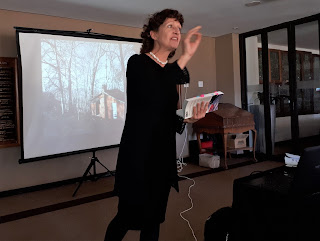It was a Business Meeting and quite a worthwhile one. It's just good to see that the club is moving forward.
Les Short has been working away at a social programme which is something that has fallen by the wayside for the last year or two which is very important.
Firlands Fete
It was also Firlands Fete last weekend as the Home is closing.
In 1923 eighteen boys were moved from the social farm in Driehoek to become the first residents of the Linden Boys’ Home. As the buildings were established 120 boys were accommodated in two dormitory style buildings. In the 1980’s the dormitories were adapted to form five separate cottages accommodating 12 boys in each cottage. In the early 1990’s the home was opened to all race groups and girls were admitted in order to keep siblings together. Its closure really is the end of an era. I am sure the land is far to valuable for the Salvation Army to keep!
Sadly we will also lose Eddie de Vos as the Army is moving him to Cape Town. We wish him and Hazel well in the future and I am sure they will link up with a new Rotary Club there.
This Week
 Our guest speaker is Alkis Doucakis. He is an interesting person and businessman.
Our guest speaker is Alkis Doucakis. He is an interesting person and businessman. The Doukakis Group manufactures curtain rods and fittings and was started as long ago as 1952 but I'm sure that's not what he is going to talk to us about!
He is also an amateur historian and in 2015 his book, In the Footsteps of Gandhi was published. It is an excellent and well worthwhile book, if you can find a copy because it details Gandhi's relationship with the architect Hermann Kallenbach and the development of the suburbs around Norwood up to Linksfield Ridge.
Ashton Kutcher and Rotary address the global scourge of human trafficking
Actor and philanthropist Ashton Kutcher took the stage at the Rotary International Convention in Atlanta, Georgia, USA, to address a major human
rights issue: human trafficking and modern-day slavery.
Kutcher, who rose to fame in the early 2000s with a series of hit film and television roles, is co-founder of Thorn: Digital Defenders of Children, an organization that combats human trafficking and the conditions that enable it. Trafficking in humans takes many forms but includes forced labor and sex slavery. It is among the world’s largest illicit trades, with many of the transactions happening online.
“As a young man coming up in the public school system in the United States, I thought slavery was done, a thing of the past," Kutcher said. "When I realized this was happening – happening even right here in Atlanta, a hotbed for trafficking as a travel hub – I was floored, and set out to learn as much as I could about it.”
Thorn specifically works to address sexual exploitation and the proliferation of child pornography online. By exploring and supporting new digital strategies for identifying victims, deterring predators, and disrupting platforms, Thorn helps lead the global conversation on trafficking – a conversation that’s continuing at Rotary’s annual convention.
More than 34,000 people, including Rotary members, partners, and friends from 175 countries and territories, have gathered in Atlanta this week to exchange ideas on how they can work together to improve lives in their communities.
Kutcher joined other prominent voices for a panel discussion on trafficking and how communities can combat it. Gary Haugen spoke about his work as CEO of International Justice Mission, a nonprofit that aims to strengthen local law enforcement and support survivors of trafficking.
Also at the panel, U.S. Senator Bob Corker of Tennessee discussed the legislative framework that allows traffickers to thrive in plain sight, and survivor Rebecca Bender offered moving testimony about the abuse she endured in the United States.
Recognizing the role that vast global networks like Rotary play in sustainable social change, Kutcher encouraged attendees to join the fight.
“There’s an inbound pipeline to trafficking," Kutcher said, "and that is vulnerability and poverty,” two issues that Rotary addresses through humanitarian projects and partnerships. Kutcher cited the example of the foster care system in the U.S. “Kids going into this system don’t have someone in their lives that loves them, which makes them vulnerable to someone who reaches out and shows them that attention. That’s how traffickers get in.”
Haugen pointed out that Rotary is already connecting with vulnerable groups, building relationships, and improving lives.
“What’s clear is this issue is everywhere around the world,” Haugen said. “There are survivors like Rebecca back home in your neighborhood and your country. Educate, serve survivors, and encourage local law enforcement, and Rotary can change this in our lifetimes.”
Learn more about how Rotary and Thorn are working together to fight trafficking, and how you can help.


























